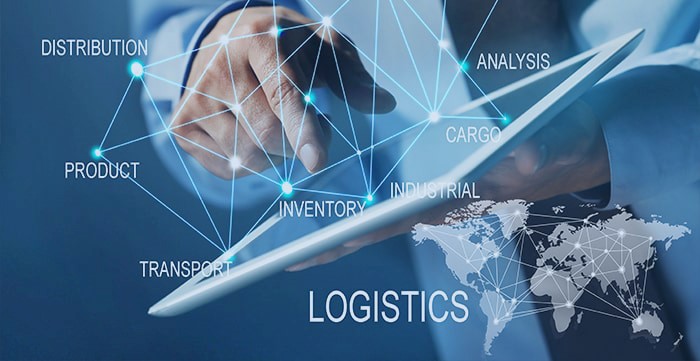In today’s globalized world, supply chains have become increasingly complex. Businesses are constantly striving to optimize efficiency, reduce costs, and deliver exceptional customer service. This is where logistics software development comes in – a powerful tool to transform your supply chain operations and gain a competitive edge.
What is Logistics Software Development?
Logistics software development refers to the creation of software applications specifically designed to manage and optimize the flow of goods, information, and services within a supply chain. These applications can range from comprehensive Transportation Management Systems (TMS) that handle freight management and route optimization to Warehouse Management Systems (WMS) that streamline warehouse operations and inventory control.
Why Invest in Logistics Software Development?
The benefits of investing in logistics software development are undeniable. Here are just a few reasons why businesses of all sizes are turning to custom-built logistics solutions:
- Boost Efficiency and Slash Costs: Streamlined operations, optimized routes, and automated tasks lead to significant cost reductions and a boost in overall efficiency. Imagine the impact on your bottom line by eliminating manual data entry, optimizing warehouse space utilization, and selecting the most cost-effective carriers.
- Gain Real-Time Visibility and Control: Real-time tracking of inventory, shipments, and assets provides greater visibility across your entire supply chain. No more scrambling to locate missing inventory or wondering where your shipments are. Logistics software empowers you with the data and insights you need to make informed decisions and proactively address any potential issues.
- Optimize Inventory Levels and Reduce Waste: Reduce stockouts, minimize overstocking, and optimize inventory levels for improved cash flow. Logistics software helps you forecast demand accurately, ensuring you have the right products in the right quantities at the right time. This translates to fewer lost sales and reduced storage costs.
- Streamline Operations and Foster Collaboration: Logistics software fosters better communication and collaboration between departments and external partners. Imagine a world where everyone in your supply chain ecosystem is working from the same data and information. This seamless collaboration leads to faster order fulfillment, improved on-time delivery rates, and happier customers.
- Deliver Exceptional Customer Service: Accurate delivery estimates, real-time order tracking, and efficient order fulfillment lead to happier customers. In today’s economy centered around customer experiences, it’s crucial to go beyond what customers expect. Logistics software empowers you to deliver a seamless customer experience from the moment an order is placed to the moment it arrives at their doorstep.
By investing in logistics software development, you’re essentially investing in the future of your supply chain.
Types of Logistics Software Solutions
The world of logistics software offers a diverse toolbox to address specific needs within your supply chain. Here’s a closer look at some key solutions and how they can empower you to achieve the benefits outlined earlier:
Transportation Management Systems (TMS):
Consider a TMS as the central nervous system for your transportation operations. It goes beyond simply booking shipments. A robust TMS helps you:
– Boost Efficiency and Slash Costs: Optimize routes for shorter delivery times and lower fuel consumption. Analyze carrier rates and negotiate the best deals. Automate tasks like shipment booking and documentation.
– Gain Real-Time Visibility and Control: Track shipments in real-time, allowing you to proactively address delays and keep customers informed. Gain insights into carrier performance and identify areas for improvement.
Warehouse Management Systems (WMS):
The warehouse is the heart of your fulfillment operation. A WMS takes control, helping you:
– Optimize Inventory Levels and Reduce Waste: Implement accurate inventory tracking and forecasting to minimize stockouts and overstocking. Optimize warehouse space utilization through smarter layout design and picking strategies.
– Streamline Operations and Foster Collaboration: Automate manual processes like picking, packing, and shipping. Integrate seamlessly with your TMS for efficient order fulfillment. Empower warehouse staff with real-time data and mobile applications to work more efficiently.
Supply Chain Management (SCM) Systems:
Offering a holistic view, an SCM system acts as your supply chain command center. It provides integrated functionalities for:
– Improved Efficiency and Cost Savings: Plan and forecast demand more accurately, optimizing production, inventory levels, and transportation based on real-time data. Identify and mitigate potential supply chain disruptions proactively.
– Gain Real-Time Visibility and Control: Gain complete visibility across your entire supply chain, from raw materials to finished goods delivery. Track inventory levels across all locations and identify potential bottlenecks.
Fleet Management Software:
For businesses with transportation fleets, this software keeps you in control. It helps you:
– Boost Efficiency and Slash Costs: Optimize maintenance schedules to reduce downtime and repair costs. Track driver behavior and fuel efficiency to identify areas for improvement.
– Gain Real-Time Visibility and Control: Monitor vehicle location and performance in real-time. Improve dispatch efficiency and optimize delivery routes for faster deliveries.
Last-Mile Delivery Management Systems:
The final leg of the delivery journey can be complex and costly. Last-mile delivery software helps you:
– Streamline Operations and Foster Collaboration: Optimize delivery routes for dense urban areas, considering factors like traffic and parking restrictions. Facilitate communication between drivers and customers for a smoother delivery experience.
– Deliver Exceptional Customer Service: Provide customers with real-time delivery tracking and estimated arrival times. Offer flexible delivery options and improve first-attempt delivery rates.
By choosing the right combination of logistics software solutions, you can transform your supply chain into a well-oiled machine, delivering the benefits of increased efficiency, improved visibility, optimized inventory, streamlined collaboration, and exceptional customer service.
The Logistics Software Development Process
Developing custom logistics software is a collaborative process that requires careful planning and execution. Here’s a breakdown of the key stages:
1. Defining Your Needs and Requirements: The first step is to identify your specific pain points and operational inefficiencies. What challenges are you facing in your current supply chain? What are your goals for implementing logistics software? Clearly defined objectives will guide the development process towards a solution that truly meets your needs.
2. Choosing a Development Partner: Selecting the right development partner is crucial. Look for a company with proven experience in logistics software development and a deep understanding of the industry’s challenges. A strong development methodology, such as Agile, ensures flexibility and ongoing collaboration throughout the project.
3. Development, Implementation, and Maintenance: The development phase involves building the software solution based on the defined requirements. Agile methodologies allow for continuous feedback and refinement throughout the process. Following successful implementation, user training and ongoing support are essential to ensure the software’s long-term success.
Emerging Trends in Logistics Software Development
The future of logistics software development is brimming with exciting possibilities. Here are a few trends that are changing the game:
- Artificial Intelligence (AI) and Machine Learning (ML): AI and ML are revolutionizing logistics by automating tasks, predicting demand fluctuations, and optimizing routes for maximum efficiency.
- The Rise of Blockchain Technology: Blockchain offers a secure and transparent way to track goods and information throughout the supply chain, fostering trust and collaboration among all stakeholders.
- The Growth of Cloud-Based Logistics Software: Cloud-based solutions offer numerous advantages, including scalability, accessibility from anywhere, and cost-effectiveness for businesses of all sizes.
Conclusion
In today’s competitive landscape, an optimized supply chain is no longer a luxury – it’s a necessity. Logistics software development empowers you to transform your operations, gain real-time visibility, and deliver exceptional customer service. By implementing the right solutions, you can streamline processes, slash costs, and unlock the true potential of your supply chain.
Are you prepared to elevate your supply chain to the next level? Contact ONextDigital today. Our team of experts can help you develop a custom logistics software solution that delivers measurable results and propels your business forward. Contact us now today.







